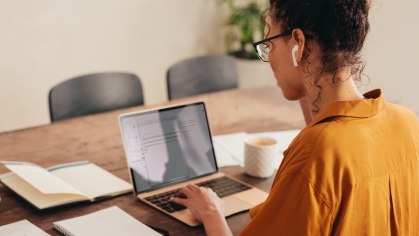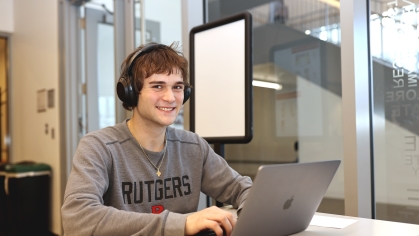Managing Screen Fatigue
Do your eyes feel tired? Do they feel dry? Have you struggled to keep your eyes open during online courses? Screen fatigue is a side effect to prolonged screen use and causes the muscles in and around the eyes to strain and get work out. Keep reading for some ways to decrease screen fatigue.
Strategies to Manage Screen Fatigue
- Use phone calls or emails as alternatives to face time and video calls
- Adjust brightness of screen; try turning on a room light
- Use blue light glasses
- Use speaker view when in video calls in order to focus on less people in the call
- Get exposure to sunlight
- Schedule time away from screens (i.e. board games/puzzles, physical activity, reading, journaling, cooking)
Having everything on the screen is stressful! It affects you cognitively (e.g., trouble concentrating), emotionally (e.g., experiencing irritability), physiologically (e.g., headaches), and behaviorally (e.g., inability to carry out routine daily activities). We may experience screen fatigue because our eyes are trying to focus on every section of the screen at one time. Additionally, we may feel fatigue from our devices due to their blue light which may cause “disrupting sleep patterns, feeling of weakness, blurred or reduced vision, eye pain, headache, [and] reduce the melatonin hormone”. Blue light also sustains our alertness and delays sleep onset. Blue light-filtered glasses decrease the negative side effects and allows our bodies to follow our sleep cycle, though somewhat delayed.
Strategies for a Better Night’s Sleep via Screen Time
- Limit blue light use prior to sleeping (15 minutes instead of 30 minutes)
- Engage in minimal social interaction
- View uninteresting posts on social media
- Engage in passive screen time (e.g., watching TV instead of playing video games)
While there are various ways to limit blue light usage, it is more effective to take breaks from screen time. Going outside and engaging in nonelectronic activities may help your overall health and stress levels. Engage socially in-person to benefit your social-emotional health. Most of our day is dedicated to screen time so, it is important for you to include non-screen time to balance your daily routine.
Accordion Content
-
- Belfast Health and Social Care Trust. (23 July, 2020). Screen Fatigue. Youtube. [video] (https://www.youtube.com/watch?v=JthqGBkwfc4)
- Bhanu Priya, D., & Subramaniyam, Murali (1 August, 2020). A Systematic Review on Visual Fatigue Induced by Tiny Screens (Smartphones). Materials Science and Engineering, Vol.912 (6), p.62009
- Bowler, J. & Bourke, P. (2019). Facebook Use and Sleep Quality: Light Interacts with Socially Induced Alertness. British Journal of Psychology, 110, 519–529.
- Hale, L., & Guan, S. (2015). Screen Time and Sleep Among School-Aged Children and Adolescents: A Systematic Literature Review. Sleep Medicine Reviews, Volume 21, p. 50-58.


